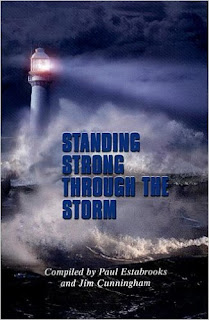The Daily Lectionary
MONDAY, December 9, 2019
(Revised Common Lectionary Year A)
(God comes with judgment and strength)
Thanksgiving for Victory
To the leader. A Psalm of David.
1 In your strength the king rejoices, O Lord,
and in your help how greatly he exults!
2 You have given him his heart’s desire,
and have not withheld the request of his lips. Selah
3 For you meet him with rich blessings;
you set a crown of fine gold on his head.
4 He asked you for life; you gave it to him—
length of days forever and ever.
5 His glory is great through your help;
splendor and majesty you bestow on him.
6 You bestow on him blessings forever;
you make him glad with the joy of your presence.
7 For the king trusts in the Lord,
and through the steadfast love of the Most High
he shall not be moved.
8 Your hand will find out all your enemies;
your right hand will find out those who hate you.
9 You will make them like a fiery furnace
when you appear.
The Lord will swallow them up in his wrath,
and fire will consume them.
10 You will destroy their offspring from the earth,
and their children from among humankind.
11 If they plan evil against you,
if they devise mischief, they will not succeed.
12 For you will put them to flight;
you will aim at their faces with your bows.
13 Be exalted, O Lord, in your strength!
We will sing and praise your power.
(Judgment is coming but glorify God)
Impending Judgment on the Earth
1 Now the Lord is about to lay waste the earth and make it
desolate,
and he will twist its surface and scatter its inhabitants.
2 And it shall be, as with the people, so with the priest;
as with the slave, so with his master;
as with the maid, so with her mistress;
as with the buyer, so with the seller;
as with the lender, so with the borrower;
as with the creditor, so with the debtor.
3 The earth shall be utterly laid waste and utterly
despoiled;
for the Lord has spoken this word.
4 The earth dries up and withers,
the world languishes and withers;
the heavens languish together with the earth.
5 The earth lies polluted
under its inhabitants;
for they have transgressed laws,
violated the statutes,
broken the everlasting covenant.
6 Therefore a curse devours the earth,
and its inhabitants suffer for their guilt;
therefore the inhabitants of the earth dwindled,
and few people are left.
7 The wine dries up,
the vine languishes,
all the merry-hearted sigh.
8 The mirth of the timbrels is stilled,
the noise of the jubilant has ceased,
the mirth of the lyre is stilled.
9 No longer do they drink wine with singing;
strong drink is bitter to those who drink it.
10 The city of chaos is broken down,
every house is shut up so that no one can enter.
11 There is an outcry in the streets for lack of wine;
all joy has reached its eventide;
the gladness of the earth is banished.
12 Desolation is left in the city,
the gates are battered into ruins.
13 For thus it shall be on the earth
and among the nations,
as when an olive tree is beaten,
as at the gleaning when the grape harvest is ended.
14 They lift up their voices, they sing for joy;
they shout from the west over the majesty of the Lord.
15 Therefore in the east give glory to the Lord;
in the coastlands of the sea glorify the name of the Lord,
the God of Israel.
16 From the ends of the earth we hear songs of praise,
of glory to the Righteous One.
(Live in holiness and love one another)
A Life Pleasing to God
4:1 Finally, brothers and sisters, we ask and urge you in the Lord Jesus that, as you learned from us how you ought to live and to please God (as, in fact, you are doing), you should do so more and more. 2 For you know what instructions we gave you through the Lord Jesus. 3 For this is the will of God, your sanctification: that you abstain from fornication; 4 that each one of you know how to control your own body in holiness and honor, 5 not with lustful passion, like the Gentiles who do not know God; 6 that no one wrong or exploit a brother or sister in this matter, because the Lord is an avenger in all these things, just as we have already told you beforehand and solemnly warned you. 7 For God did not call us to impurity but in holiness. 8 Therefore whoever rejects this rejects not human authority but God, who also gives his Holy Spirit to you.
9 Now concerning love of the brothers and sisters, you do not need to have anyone write to you, for you yourselves have been taught by God to love one another; 10 and indeed you do love all the brothers and sisters throughout Macedonia. But we urge you, beloved, to do so more and more, 11 to aspire to live quietly, to mind your own affairs, and to work with your hands, as we directed you, 12 so that you may behave properly toward outsiders and be dependent on no one.
Optional parts of the readings are set off in [square brackets.]
The Bible texts of the Old Testament, Epistle and Gospel lessons are from the New Revised Standard Version Bible, copyright 1989 by the Division of Christian Education of the National Council of the Church of Christ in the USA, and used by permission.
The Daily Lectionary is a three year cyclical lectionary. We are currently in Year A. Beginning with the first Sunday of Advent in 2020, we will be in Year B. The year which ended at Advent 2019 was Year C. These readings complement the Sunday and festival readings: Thursday through Saturday readings help prepare the reader for the Sunday ahead; Monday through Wednesday readings help the reader reflect and digest on what they heard in worship. Revised Common Lectionary Daily Readings, copyright © 2005 Consultation on Common Texts. www.commontexts.org
The Daily Lectionary for MONDAY, December 9, 2019
Psalm 21; Isaiah 24:1-16a; 1 Thessalonians 4:1-12









